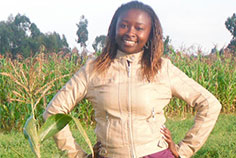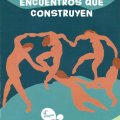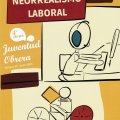Monicah Wabjiru (CIJOC)
- 01 Octubre 2015

Es la Secretaria General de la Coordinación Internacional de la JOC (CIJOC)
ENTREVISTA A MONICAH – INTERVIEW TO MONICAH
En el Juventud Obrera de octubre hemos entrevistado a Monicah Wabjiru. . Tiene 32 años y es de la JOC de Kenia.
Puedes leer la entrevista traducida al español en la revista en papel…
Y aquí la entrevista original en inglés. ¡Que la disfrutes!
Monicah Wabjiru is the General Secretary of the CIJOC. She is 32 years old, and she belongs to Young Christian Workers (YCW) of Kenya.
How did you meet YCW?
My first encounter with YCW was in 2004 in my parish. I participated in a YCW national formation programme and went through a 2-year training programme after which I was commissioned as a leader.
Which has been the influence of YCW in your life?
Through the See-Judge-Act methodoly, I have grown in my sense of responsibility for what is happening around me and the people around me. I have learnt to be empathetic, to be analytical in finding solutions, to be critical of what is not right, to be a friend to those who need someone to lean on, to give hope and a smile to those facing difficulties.
Through YCW I was given a voice, a sense of belonging, and friendship. I realised that change starts with me and that I could influence what was happening around me. I discovered that I had many talents, abilities, and capacities. In my YCW mission, I helped other young people to discover the hidden treasures they had inside.
What do you highlight from the action of YCW?
YCW offers valuable tools for leadership formation and a place for reflection and action. Through action, we create awareness, knowledge, and enlightment. Through action, we give life to our Christian faith and share the joy and love of Christ. Through action we transform our lives and the lives of those around us.
How is the situation of YCW in Kenya?
YCW in Kenya is present in 8 dioceses and comprises of young people (18-35 years) who are either employed, unemployed, self-employed, student-workers, or students. The informal sector employs most of the young people who are working. YCW ensures representation and participation of young people at various levels in the church and society. Majority of YCW groups in Kenya are involved in employment creation activities for young people. There are ongoing trainings and exchanges at parish and diocese levels, and extension of YCW to dioceses where it does not exist.
Which is your mission and tasks in the International Secretariat?
I was elected into the ICYCW International Secretariat in September 2012, during the 8th ICYCW International Council held in Birmingham, England. Before the election, I was serving as the National Secretary of the Kenya YCW.
As members of the international secretariat, my colleagues and I are mandated to implement the decisions and resolutions of the International Council which promote the development of the YCW around the world while upholding the founding principles and objectives.
As the general secretary, I am responsible for the functioning of the International secretariat, proposing programmes for different sessions of the international secretariat, managing correspondences of the ICYCW, coordinating the report writing for different activities of the coordination, organizing and maintaining the ICYCW archives, and also implementing the decisions taken by the International council and the international secretariat.
As the ICYCW Coordinator for national movements in East Africa, West Africa, and Middle East, I promote and help maintain constant communication with the national movements and between the national movements; coordinate training and exchanges for young leaders and chaplains within the regions; provide training and information materials to national movements; represent the movement and maintain close link with the church, partner organizations, institutions and developmental agencies; and extend YCW to areas where it does not exist.
Could you explain us briefly what is the CIJOC? Which is its mission?
The ICYCW is a coordination of autonomous YCW national movements from around the world.
It promotes the development of YCW and extension to countries where it does not exist; supports training and exchanges of young people and chaplains from the national movements; promotes communication and solidarity between countries and continents; and represents the national movements and young people’s situation, hopes and actions at different international organizations and institutions.
The ICYCW is actively present in 42 countries around the world; in Africa, Europe, Middle East, Asia, and Latin America and America.
Africa: Senegal, Burkina Faso, Guinea Conakry, Ivory Coast, Mali, Togo, Benin, Nigeria, Chad, Cameroon, Congo Brazzaville, Central Africa Republic, Rwanda, Burundi, Ethiopia, Kenya, Uganda, Tanzania, Malawi, Reunion Island, Mauritius, Rodriguez island, Madagascar.
Asia: Cambodia, Philippines, India, South Korea, China.
Middle East: Dubai, Holy Land Jerusalem, Holy Land Bethlehem, Jordan, Lebanon.
Europe: Malta, Hungary, Italy, France, Spain, Portugal, England & Wales.
Latin America & America: Dominica Republic and Canada.
When is the international day of CIJOC and why?
The ICYCW International day is celebrated on 13 November which is also the birthday of Joseph Cardijn, the founder of YCW.
On this day, we promote the international dimension of the ICYCW to enable young people to know more about the ICYCW; its mission, vision and objectives. It is a day that brings all the young workers together as one big family, to become aware of the life and actions of young people and the YCW in other countries.
What have you learnt from the experience of the YCW in different countries?
The challenges facing us are very similar, but there is a lot of beauty in the diversity of actions taken by young workers from around the world.
Our Christian faith and common mission of evangelization brings us together making YCW a home and a family.
YCW is very dynamic and alive in many places around the world and there is a lot to learn from the successes of other young workers.
I have learnt that when I act alone, I can go very fast. But when we act together, we can go very far.


